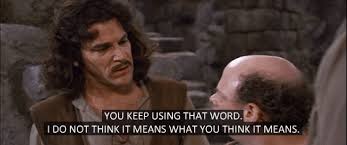
“You Keep Using That Word, I Do Not Think It Means What You Think It Means”
~ Inigo Montoya, swordsman and revenge obsessive, from The Princess Bride
This month “Most Managers Don’t Know How to Coach People. But They Can Learn.” was published in Harvard Business Review, publishing the findings of a study that concluded:
“managers tend to think they’re coaching when they’re actually just telling their employees what to do”
I’ll distil the distinction to basics, then explain how one can address this major gap in the leadership of most organisations.
Consulting = Telling People what to do.
Coaching is NOT Consulting. Coaching is ASKING.
To explain that further, I begin with the definition of coaching used in the article from Sir John Whitmore:
“unlocking a person’s potential to maximize their own performance. It is helping them to learn rather than teaching them.”
Consulting is TELLING, where you listen to people only deeply enough to identify the problem they need YOU to solve for them, then you give them your expert advice.
Coaching is ASKING, so you listen deeply, and through listening, unlock in the person the answers they already have inside.
Yes, a master coach will have a deep and wide toolkit to unlock source issues, apply tools, frameworks, techniques. At essence though, a coaching mindset starts with BELIEF that the client has the answers they need within them. It is the role of the coach to unlock them.
So, if, as Inigo Montoya might have said: “I do not think coaching means what you think it means.”, and if managers and leaders in organisations are (as the article and study clearly indicate) poor at actually coaching, let us take heart from another finding:
“The good news is that managers can improve their coaching skills in a short amount of time (15 hours), but they do have to invest in learning how to coach in the first place.”
As soon as I read this article, I sent it across to a long time collaborator, a senior HR leader of large global corporations, and a brave and strategic leader with a visionary mindset. A number of years ago we worked together to design, develop and deliver a programme for some of the next generation of global leaders in the business he led HR for.
As part of an eighteen-month global leadership programme for these elite future leaders, each was assigned a coach. That coach was typically a head of a country and sometimes even the person who they may succeed. In almost every case, the coach assigned was older and more senior in the organisation, which added to the tendency to consult (or mentor “let me tell you what I did in your position” etc).
The specialist programme we created came from our recognition that these internal coaches would tend NOT to coach, but to consult.
Our programme was an intense one day programme followed up with calls to support the coaches throughout the eighteen month programme. All in all it was only, as the article noted, about a 15 hour commitment for each internal coach.
The one day programme was a one-day distillation of a programme the coaches in our own global coaching business went through over the course of several months. The intention was simple. To hammer home that the role was to COACH, not to CONSULT, to let the coachee work it out for themselves, to only give them advice as a last resort.
Several years ago the two of us recognised the power of reinforcing what coaching actually is and passing on core skills, as now reinforced by the HBR article, we are now collaborating on a new project.
A last point from the HBR article is that it while it highlights that 15 hours can “improve their coaching skills”, let me be clear. It takes longer than 15 hours to become a good coach, let alone the thousands of hours of development, training, practice to gain a level of mastery.
We are therefore looking to evolve that prior programme into a one year programme for coaches in the global business he is now in. This will link it to the “rewire, don’t retire” concept from Chip Conley’s Modern Elder movement.
We imagine the power of taking experienced top leaders in a large organisation and “rewiring” them as coaches for their business, giving them skills and the focus on what coaching actually is, so massively empowering them to leverage their decades of experience to support others in their organisation.
We imagine a cohort of senior leaders energising and inspired to
“unlocking a person’s potential to maximize their own performance. It is helping them to learn rather than teaching them.”
Modern Elders as Coaches, unlocking potential.
I’m excited about the future of these Modern Elders. If this could resonate with and for your organisation, do contact me, I’d love to share this opportunity widely.
